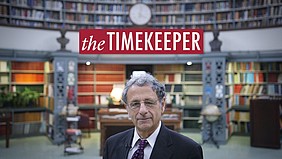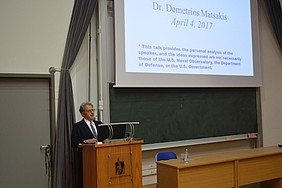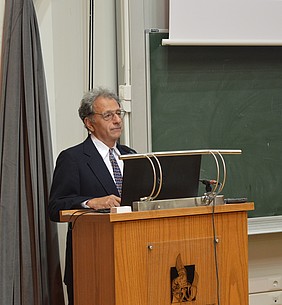Στις 04 Απριλίου 2017 στο Κτήριο Επιστημών στην Πολυτεχνειούπολη, δόθηκε διάλεξη με τίτλο "Time in the Modern World" από τον Dr. Demetrios Matsakis (Chief Scientist for Time Services, USNO). Ο επονομαζόμενος “Father of time” (πατέρας του χρόνου) είναι υπεύθυνος για το Master Clock, δηλαδή το θεμελιώδες ατομικό χρονόμετρο της Αμερικής. "Το Μaster Clock βασίζεται στη λειτουργία περισσοτέρων των 100 ατομικών χρονομέτρων, τα οποία είναι τόσο ακριβή ώστε να μην χάσουν ούτε ένα δευτερόλεπτο μέσα στα επόμενα 300 δισεκατομμύρια έτη!".
Η διοργάνωση της διάλεξης πραγματοποιήθηκε από το Εργαστήριο Γεωδαισίας & Πληροφορικής των Γεωεπιστηµών (Διευθυντής: Καθηγητής Σ. Μερτίκας) της Σχολής Μηχανικών Ορυκτών Πόρων.
Παρακολουθήστε την ομιλία του Dr. Matsakis από το κανάλι του Πολυτεχνείου Κρήτης.
Περίληψη ομιλίας:
Time has always held a fascination for humanity. While we all wish we could control it, in today’s society there is a practical need to understand and measure it to the nanosecond level and below. I will talk a little about how we used to measure time, but emphasize how we do it now and how we will do it in the near future. Today our most important critical user of precise time is GPS, and I’ll talk about some of the problems, and benefits, Global Navigational Satellite Systems provide. This talk will be the personal opinions of the speaker and the ideas expressed are not necessarily those of his employer or the U.S. government.
Σύντομο Βιογραφικό
Dr. Demetrios Matsakis is a physicist who went to MIT and U.C. Berkeley, where he studied under the Nobel-prize winning professor who invented the laser, and constructed two special-purpose lasers to study the molecular clouds where stars are born. After graduating he used radio astronomy to measure the wobbles in the Earth’s rotation, by looking at quasars near the edge of the observable universe. Later he became interested in timekeeping with atomic clocks and rapidly spinning neutron stars (pulsars). He went on to manage the Time Service Department of the US Naval Observatory, which uses over 100 atomic clocks to set the time for GPS and much of the world. Under his management, a set of four atomic fountains was designed and built, measuring time to 16 decimal places. This is currently the most precise 24x7 measurement system ever built by mankind to measure anything. He is a past president of the International Astronomical Union’s Time Commission, has served on many international commissions related to the timekeeping art, represented the U.S. in Geneva. He holds one patent and published over 140 papers along with one short story that is admittedly pure science fiction.

















